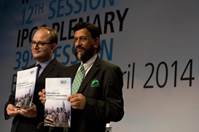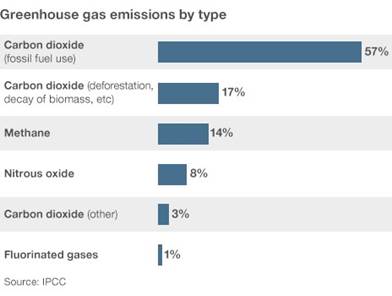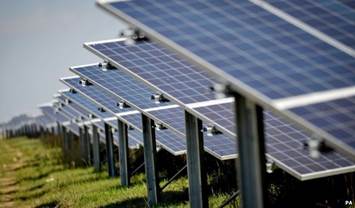 Global Issues >> Environment >> Climate Change World Must End "Dirty" Fuel Use — UN IPCCMatt McGrath, Environment correspondent, BBC News, Berlin
The report is the work of the UN's Intergovernmental Panel on Climate Change (IPCC), which was set up to provide a clear scientific view on climate change and its impacts. The Summary for Policymakers on mitigation paints a picture of a world with carbon emissions rising rapidly. "The high speed mitigation train needs to leave the station very soon, and all of global society will have to get on board," the IPCC's chair Dr. Rajendra Pachauri (at right) told journalists in Berlin at the launch of the report. Dr Youba Sokono, a co-chair of the IPCC's working group 3, which drew up the report, said science has spoken. He added that policy makers were "the navigators, they have to make decisions, scientists are the map makers" . The UK's Energy and Climate Change Secretary Ed Davey said global warming needed to be tackled using "all technologies" . He told BBC News: "We can do this, we have to because it's so challenging and threatening to our economies and societies, our health, our food security. The report today shows we can do it if we have the political will. " He added that the UK government was a leader on the use of renewable energy sources, saying: "We've, for example, doubled the amount of renewable electricity in the last few years. We're likely to do better than our targets in increasing renewable electricity. But we've got to do more. "
Driven by a global increase in population and economic activity, global surface temperature increases will be between 3.7C and 4.8C in 2100 if no new action is taken. This is way above the 2 degree level, regarded as the point beyond which dangerous impacts of climate change will be felt. However, the scientists involved in the report say this situation can be turned around. "It needs a big change in the energy sector, that is undoubtedly true," said Prof Jim Skea, vice-chair of working group 3. "One of the biggest areas that's important is getting the carbon out of electricity, so renewable energy, nuclear, fossil fuels with carbon capture and storage, that's all part of the menu if we are going to make the transition to stay under the 2 degree target. " It is not a simple task. To be sure of staying below 2 degrees, the amount of carbon in the air needs to be around 450 parts per million by 2100. To get there, emissions in 2050 need to be 40-70% lower than they were in 2010. The IPCC says that renewables are a critical part of that pathway. Since the last report in 2007, the scientists say that renewable energy has come on in leaps and bounds. In 2012, renewables accounted for just over half of the new electricity generation added around the world. The scientists stress that renewables are becoming economically competitive with fossil fuels and also offer a range of other benefits, including clean air and energy security. "It certainly is the end for carbon intensive fuels that's for sure," said Jennifer Morgan from the World Resources Institute, who was a review editor on one of the chapters of the IPCC report. "There needs to be a massive shift away from fossil fuels and investment needs to shift to going 100% clean as fast as possible. " Prof Ottmar Edenhofer, co-chair of working group 3, said: "Mitigation does not mean the world has to sacrifice economic growth. " He explained that the report added "modest hope" , but added: "Climate policy is not a free lunch. " One of the surprising endorsements in the report is natural gas. "Emissions from energy supply can be reduced significantly by replacing current world average coal-fired power plants with modern, highly efficient natural gas combined-cycle power plants," says the summary. The report describes natural gas as a "bridge" technology with deployment increasing before peaking and falling below current levels by 2050. However many of the scenarios examined by the panel would still involve an "overshoot" of the target range. To cope with this the world may need to remove carbon from the atmosphere. Combining carbon capture and storage with bioenergy is seen as one potential solution, but the report is lukewarm on these ideas, saying the "methods are uncertain" and are "associated with risks" .
The report points out that there needs to be huge shifts in investment if the worst impacts of rising temperatures are to be avoided. Investment in renewables and other low carbon sources needs to at least treble by the middle of the century, while money flowing into fossil fuels has to diminish. But differences have emerged over who should make the cuts in emissions and who should pay for the switch to low carbon energy sources. Developed and developing countries have clashed here in Berlin, echoing divisions found in the UN negotiations. "It is true that some of the dynamics that we see in the UNFCCC negotiations were visible here as well," said Kaisa Kosenen from Greenpeace. "It is an indication that the key question of equity - who should do what and who should pay for the damages already caused. " Other participants believed that this new report could actually help push the UN process forward. "I hope that this information from the IPCC can kind of do a bit of a tectonic shift into a co-operating mode rather than a finger pointing mode between countries," said Jennifer Morgan. "There's too much at stake. "
|
Email this page to a friend
If you speak another language fluently and you liked this page, make
a contribution by translating
it! For additional translations check out FreeTranslation.com
(Voor vertaling van Engels tot Nederlands)
(For oversettelse fra Engelsk til Norsk)
(Для дополнительных
переводов проверяют
FreeTranslation.com )


 A
long-awaited UN report on how to curb climate change says the world must
rapidly move away from carbon-intensive fuels.
A
long-awaited UN report on how to curb climate change says the world must
rapidly move away from carbon-intensive fuels.  About half of all the carbon that humans have pumped into
the atmosphere since 1750 has been emitted in the last 40 years. Rates
have been rising fast since 2000, despite the global economic crash. The report
points to an increased use of coal in the decade from the turn of the millennium, "reversing the longstanding trend of decarbonisation of the world's
energy supply" .
About half of all the carbon that humans have pumped into
the atmosphere since 1750 has been emitted in the last 40 years. Rates
have been rising fast since 2000, despite the global economic crash. The report
points to an increased use of coal in the decade from the turn of the millennium, "reversing the longstanding trend of decarbonisation of the world's
energy supply" . Timing is everything, say the scientists. "Delaying
mitigation efforts beyond those in place today through 2030 is estimated to
substantially increase the difficulty of the transition to low longer-term
emissions," says the summary. "If we delay we are faced with
hard choices," said Prof Skea. "Do we give up on the 2
degrees target or do we employ these techniques that suck CO2 out of the
atmosphere - if we proceed promptly and we get a deal in Paris next year, then
we need to rely less on these ideas. "
Timing is everything, say the scientists. "Delaying
mitigation efforts beyond those in place today through 2030 is estimated to
substantially increase the difficulty of the transition to low longer-term
emissions," says the summary. "If we delay we are faced with
hard choices," said Prof Skea. "Do we give up on the 2
degrees target or do we employ these techniques that suck CO2 out of the
atmosphere - if we proceed promptly and we get a deal in Paris next year, then
we need to rely less on these ideas. "